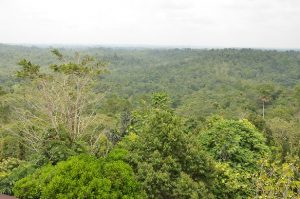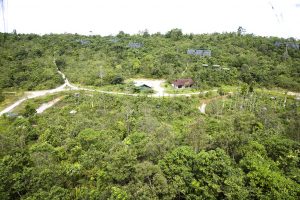Samboja Lestari
East Kalimantan
Orangutan Reintroduction Program
The East Kalimantan Orangutan Reintroduction Program at Samboja Lestari was the first orangutan reintroduction program established by the Borneo Orangutan Survival (BOS) Foundation in 1991, specifically to provide care and rehabilitation for displaced or orphaned orangutans rescued from areas of habitat loss.
Formally known as Wanariset, the project was relocated in 2006, due to insufficient space, and was renamed Samboja Lestari. The program is currently located about 38 kilometres from Balikpapan, in East Kalimantan. We work in collaboration with the East Kalimantan Conservation and Natural Resources Authority (BKSDA), an executive technical unit of the Indonesian Ministry of Forestry. The about 1800 hectares of land at Samboja Lestari are owned by the BOS Foundation and are the location of our forest rehabilitation program.
Our main activities at Samboja Lestari include orangutan rescue, translocation of orangutans from areas of conflict to areas of secure and protected habitat, the provision of welfare and healthcare, rehabilitation, reintroduction and forest restoration activities. In addition to orangutan rehabilitation and reintroduction, we manage a sun bear sanctuary at Samboja Lestari, with over 70 sun bears currently in our care. Conservation of habitat and wildlife can only be achieved by working together with local communities and other stakeholders, hence in all areas of our work we engage with local communities and schools on community development activities and outreach conservation education.

Reforestation at Samboja Lestari
The BOS Foundation has rescued hundreds of orangutans in East Kalimantan and currently cares for and supports over 120 orangutans at Samboja Lestari.
Orangutan rescue and release
Orangutans that have been displaced from areas of natural habitat due to human development activities are frequently forced to range long distances in search of food. Often they wander into palm oil plantations or community gardens as they simply have no other alternative. Together with BKSDA, we rescue orangutans from these situations and if healthy, can immediately release them to areas of safe, secure natural habitat. This practice is commonly known as translocation. In situations where an orangutan has suffered injury or illness, we provide dedicated healthcare to ensure their recovery for future translocation or later reintroduction.
Orangutan rehabilitation and reintroduction
The BOS Foundation manages two reintroduction programs; Nyaru Menteng in Central Kalimantan and Samboja Lestari in East Kalimantan. Both of these programs focus on rehabilitation and reintroduction activities in line with national and international (IUCN) guidelines and criteria. When an infant orangutan is taken away from its mother, he or she loses a whole life time of early learning. Therefore, the purpose of rehabilitation is to equip orphaned orangutans with the skills they need to survive once they are old enough to be reintroduced to the forest.
Rehabilitation process
Healthcare and quarantine
Each orangutan arriving at one of our reintroduction programs goes through routine quarantine procedures and health checks (physical and psychological). This is very important as many rescued orangutans have been exposed to human diseases which they would not normally encounter in the wild.
Rehabilitation
The majority of the orangutans who enter our facilities are still very young, so in need of orangutan-peer interaction and daily lessons on forest survival. During rehabilitation, orangutans are taught and encouraged to build nests, select appropriate natural foods and recognise natural predators. This process starts in Baby School and progresses through different levels of Forest School, where each day is spent in the forest learning new skills. Skills acquired by each individual are assessed before moving them up through the levels. When an orangutan has successfully completed all groups in Forest School, she or he progresses to ‘university’ – a pre-release island on which the student can put her or his skills to the test. This is the last step before the final release to the wild. Prior to their move to a pre-release island or their forever home, all release candidates have to spend time in quarantine, to make sure they are healthy and ready for their next big step. Dependent on the age and existing skills each orangutan has, rehabilitation can take up to seven years.

Samboja Lestari facilities
Reintroduction
Our overriding goal is to reintroduce orangutans back to secure natural habitat to establish new viable long-term populations to bolster conservation of the species in the wild. Run by RHOI (Indonesian Orangutan Habitat Restoration), a company established by the BOS Foundation for the purpose of obtaining Ecosystem Restoration Concessions, the forest areas we have secured for our reintroduction program in East Kalimantan are established with camps, equipment and trained personnel to ensure that our Orangutan Field Monitoring Programs are able to continuously monitor each orangutan’s adaptation to their natural habitat. This involves a great deal of ongoing logistical support and planning and is very costly. You can support our release programs through your donations.
Long-term sanctuary
Very sadly, some of our orangutans can never be returned to the wild due to illness or injury. Our dedicated team continues to provide welfare and healthcare to these individuals, which they will need for the rest of their lives. An orangutan can live for 50 years in captivity, and we will ensure that we continue to provide each individual with the highest level of long-term care and sanctuary.
Samboja Lodge
Samboja Lodge is an eco-lodge located within Samboja Lestari and managed by BOS Foundation.
Guests are able to stay at the lodge and simply enjoy the forest, or become involved as BOS Australia volunteers in conservation activities including maintenance of orangutan and sun bear facilities, tree planting and learning about organic farming.
Volunteer opportunities at Samboja Lestari
Visit Samboja Lestari independently
Please note, guests at Samboja Lestari have no direct contact with the orangutans.
How Can You Help
There are lots of ways you can support orangutans and help ensure the survival of this precious ape.
Adopt an Orangutan
Orangutans are endangered and at risk of extinction. Habitat destruction results in hundreds of orphaned orangutans, who rely on our care every year. You can help by adopting one. Their dedicated ‘nannies’ teach them everything they need to know for when it’s time to release them back to the wild. You can follow their progress through Forest School.
Make a Donation
Please help the Orangutans in their struggle for survival. Your donation is important and goes directly to BOS Indonesia.
By donating, you are helping bring this noble yet endangered species back from the brink of extinction and on a path to freedom – from rescue to rehabilitation and release.
Visit Our Shop
The perfect gift for any occasion! Choose from our selection of instant gifts that directly support our orangutans. You can buy a wheelbarrow, provide food for an orangutan for two months or lots more. You will receive a certificate, personalised with the name of your choice – perfect gift for you or a friend.





